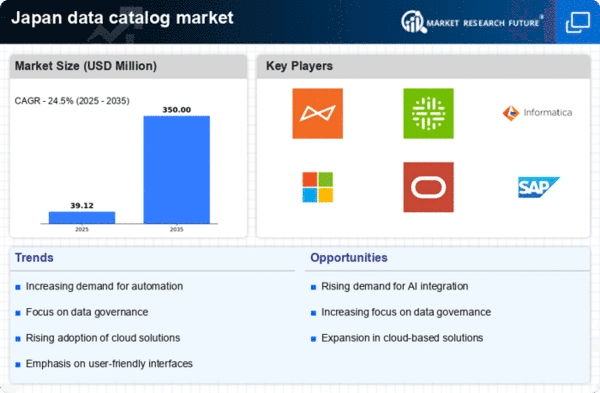Emphasis on Data Quality and Integrity
In Japan, the data catalog market is witnessing a heightened emphasis on data quality and integrity. Organizations are increasingly aware that high-quality data is essential for accurate analytics and reporting. As a result, investments in data catalog solutions that ensure data accuracy and reliability are on the rise. Recent surveys indicate that approximately 70% of businesses prioritize data quality initiatives, recognizing that poor data can lead to misguided strategies and financial losses. This focus on data integrity not only enhances operational performance but also fosters trust among stakeholders, thereby driving the demand for robust data catalog solutions.
Rising Demand for Data-Driven Decision Making
The data catalog market in Japan experiences a notable surge in demand as organizations increasingly recognize the value of data-driven decision making. Companies are striving to leverage data analytics to enhance operational efficiency and drive innovation. According to recent estimates, the market is projected to grow at a CAGR of approximately 15% over the next five years. This growth is fueled by the need for businesses to harness vast amounts of data generated daily. As organizations seek to improve their competitive edge, the data catalog market plays a crucial role in enabling effective data management and accessibility, thereby facilitating informed decision-making processes.
Regulatory Compliance and Data Privacy Concerns
The data catalog market in Japan is significantly influenced by regulatory compliance and data privacy concerns. With stringent regulations such as the Act on the Protection of Personal Information (APPI), organizations are compelled to adopt data catalog solutions that facilitate compliance. The market is responding to this need by offering tools that help businesses manage and protect sensitive data effectively. As compliance requirements evolve, the demand for data catalog solutions that ensure adherence to legal standards is expected to grow. This trend indicates a proactive approach by organizations to mitigate risks associated with data breaches and non-compliance penalties.
Expansion of Data Ecosystems and Collaborative Platforms
The data catalog market in Japan is experiencing a transformation due to the expansion of data ecosystems and collaborative platforms. Organizations are increasingly recognizing the importance of sharing data across departments and with external partners to drive innovation and enhance decision-making. This trend is leading to a growing demand for data catalog solutions that facilitate data sharing and collaboration. Recent analyses suggest that approximately 60% of companies are investing in collaborative data platforms to improve data accessibility and usability. As the data ecosystem evolves, the data catalog market is poised for growth, driven by the need for integrated solutions that support collaborative data initiatives.
Growing Adoption of Artificial Intelligence and Machine Learning
The integration of artificial intelligence (AI) and machine learning (ML) technologies is reshaping the data catalog market in Japan. Organizations are increasingly leveraging AI and ML to automate data management processes, enhance data discovery, and improve analytics capabilities. This technological advancement is expected to drive market growth, with projections suggesting a potential increase in market size by 20% over the next few years. As businesses seek to harness the power of AI and ML, the demand for sophisticated data catalog solutions that can seamlessly integrate with these technologies is likely to rise, further transforming the landscape of data management.
















